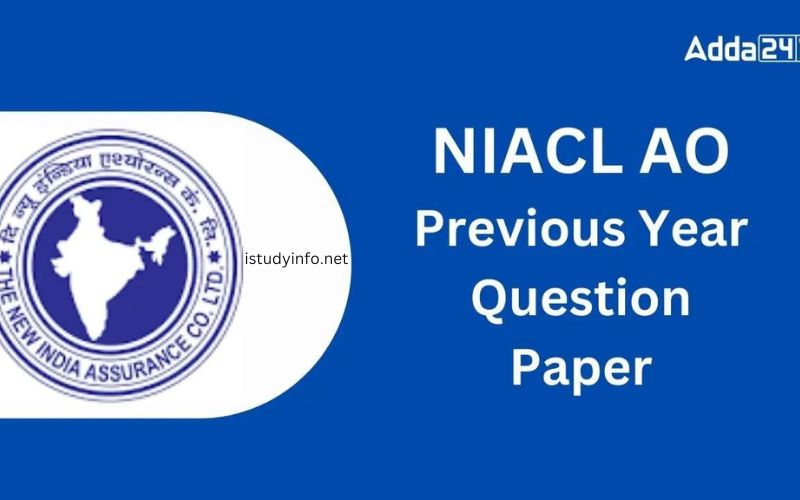The New India Assurance Company Limited (NIACL) Administrative Officer (AO) examination is one of the most sought-after competitive exams for candidates aspiring to build a career in the insurance sector. As the exam pattern and syllabus are updated periodically, analyzing previous year question papers becomes crucial for understanding the nature of the exam, identifying important topics, and devising effective preparation strategies.
Understanding the NIACL AO Exam Pattern
The NIACL AO exam is conducted in three phases:
- Preliminary Examination: This is the first stage, designed to screen candidates for the main examination. It consists of three sections:
- English Language
- Reasoning Ability
- Quantitative Aptitude
- Main Examination: Candidates who clear the preliminary examination move on to the main examination, which is more comprehensive. It includes both objective and descriptive sections:
- Objective Test: Includes Reasoning, English Language, General Awareness, and Quantitative Aptitude.
- Descriptive Test: Includes Essay and Letter Writing.
- Interview: The final phase is the interview, where candidates’ personalities and soft skills are assessed.
Importance of Previous Year Question Papers
Analyzing previous year question papers is an indispensable part of exam preparation for several reasons:
- Understanding the Exam Pattern: Familiarity with the structure and format of the exam helps in managing time effectively during the actual examination.
- Identifying Important Topics: Frequent topics can be identified, helping candidates prioritize their study.
- Practicing Time Management: Solving previous papers under timed conditions aids in improving speed and accuracy.
- Assessing Difficulty Level: Understanding the complexity of questions helps in gauging the preparation level required.
Detailed Analysis of Previous Year Question Papers
Preliminary Examination
- English Language: This section typically includes questions on reading comprehension, error spotting, fill in the blanks, cloze test, and sentence improvement.
- Reading Comprehension: Usually includes one or two passages followed by 5-10 questions testing the ability to understand and interpret the content.
- Error Spotting and Sentence Improvement: Tests grammar and usage skills.
- Fill in the Blanks and Cloze Test: Focuses on vocabulary and contextual understanding.
Trend: Over the years, the difficulty level has remained moderate with a mix of direct and inferential questions. Candidates need to focus on grammar rules and practice reading diverse materials to improve comprehension skills.
- Reasoning Ability: This section includes puzzles, seating arrangements, syllogisms, inequalities, coding-decoding, and logical reasoning.
- Puzzles and Seating Arrangements: These form a significant part of the reasoning section and require a good understanding of logical sequences and arrangements.
- Syllogisms and Inequalities: Test the candidate’s ability to deduce conclusions from given statements.
- Logical Reasoning: Involves questions based on patterns, sequences, and logical sequences.
Trend: The reasoning section often features moderate to high difficulty level questions. Regular practice of various types of puzzles and logical reasoning problems is crucial.
- Quantitative Aptitude: This section covers arithmetic, data interpretation, number series, and simplification.
- Arithmetic: Includes questions on percentages, profit and loss, time and work, averages, and ratios.
- Data Interpretation: Involves interpreting data from graphs, charts, and tables.
- Number Series and Simplification: Test basic numerical ability and calculation skills.
Trend: The quantitative aptitude section has shown a mix of easy to moderate questions. Practicing basic arithmetic and data interpretation problems can significantly enhance performance.
Main Examination
- Reasoning Ability: Similar to the prelims but with a higher difficulty level and more complex puzzles and arrangements.
- English Language: Includes advanced comprehension, precise writing, and more complex grammatical questions.
- Essay and Letter Writing: The descriptive section tests the candidate’s ability to articulate thoughts coherently and effectively.
- General Awareness: This section tests knowledge of current affairs, especially related to the insurance sector, banking, and finance.
- Static GK and Current Affairs: Questions are often based on recent events, government schemes, economic developments, and important dates.
- Quantitative Aptitude: More advanced problems compared to the preliminary exam, requiring a deeper understanding of concepts and faster problem-solving skills.
Trend: The main examination is designed to test in-depth knowledge and analytical skills. Candidates should stay updated with current affairs and practice writing essays and letters on diverse topics.
Effective Preparation Strategies
Based on the analysis of previous year question papers, the following strategies can be highly effective:
- Structured Study Plan: Create a comprehensive plan that covers all topics systematically, allowing time for revision and practice tests.
- Regular Practice: Solve previous year question papers and mock tests regularly to build speed and accuracy. Focus on weaker sections to improve overall performance.
- Stay Updated: For the General Awareness section, regularly read newspapers, follow reliable news portals, and use apps or websites dedicated to current affairs.
- Focus on Basics: Ensure a strong grasp of basic concepts, especially in quantitative aptitude and reasoning. Use standard textbooks and online resources to strengthen fundamentals.
- Time Management: Develop the ability to allocate appropriate time to each section during practice tests. Learn to quickly identify and attempt easier questions first.
- Improve Writing Skills: Practice writing essays and letters on a variety of topics. Pay attention to clarity, coherence, and grammar to excel in the descriptive section.
Conclusion
The NIACL Administrative Officer exam is challenging but manageable with the right approach and preparation. Analyzing previous year question papers provides invaluable insights into the exam pattern, important topics, and the difficulty level of questions. By adopting a structured study plan, practicing regularly, and staying updated with current affairs, candidates can enhance their chances of success. Remember, consistency and perseverance are key to cracking the NIACL AO exam.













